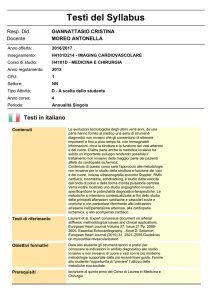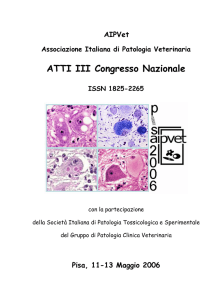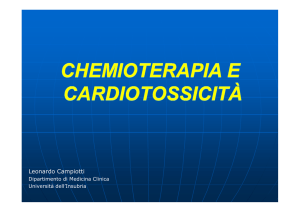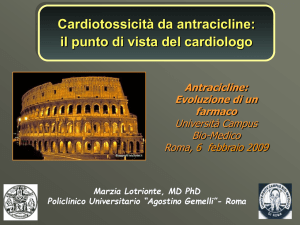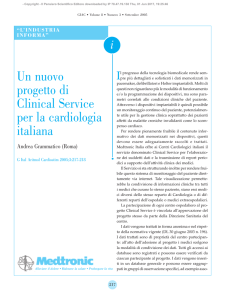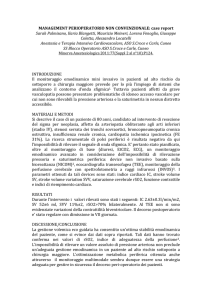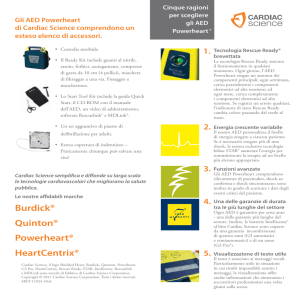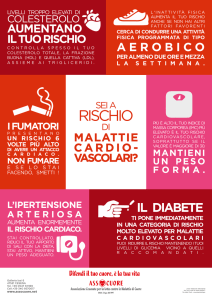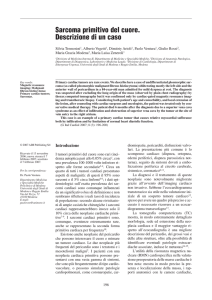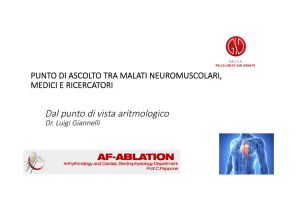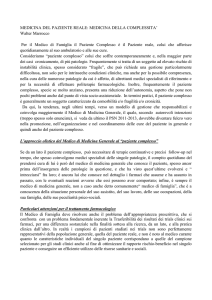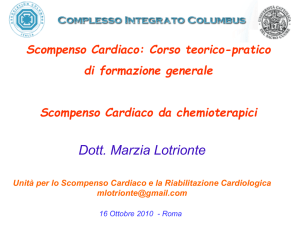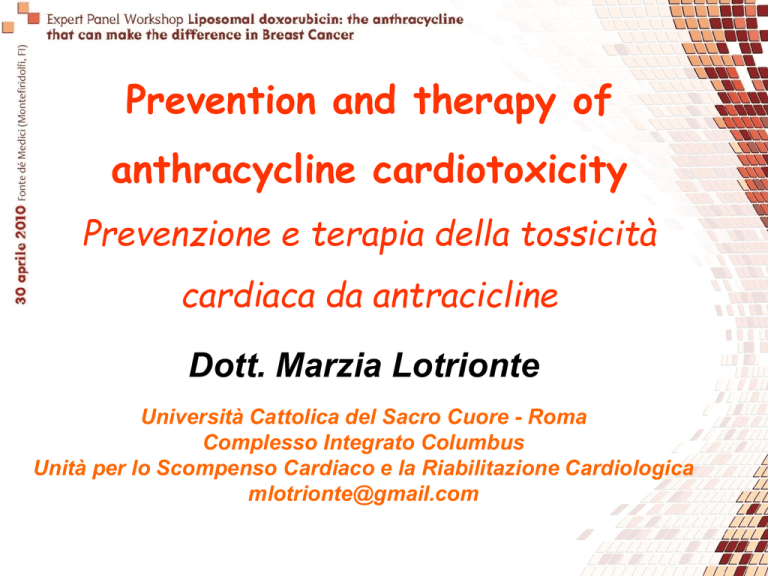
Prevention and therapy of
anthracycline cardiotoxicity
Prevenzione e terapia della tossicità
cardiaca da antracicline
Dott. Marzia Lotrionte
Università Cattolica del Sacro Cuore - Roma
Complesso Integrato Columbus
Unità per lo Scompenso Cardiaco e la Riabilitazione Cardiologica
[email protected]
INTRODUZIONE
Le antracicline, antibiotici glicosidici, rappresentano
una classe di agenti citotossici efficaci nel
trattamento di un ampio spettro di neoplasie tra cui
il carcinoma della mammella
Il loro potenziale terapeutico è limitato dallo sviluppo
di cardiotossicità, che può indurre a scompenso
cardiaco irreversibile
Ne consegue un aumento della morbilità e mortalità
dei
pazienti
sottoposti
a
tale
trattamento
chemioterapico
Lipshultz et al, 2005
DEFINIZIONE
The cardiac review and evaluation committee supervising trastuzumab
clinical trials, which defined drug-associated cardiotoxicity as one or
more of the following:
– 1) cardiomyopathy in terms of a reduction in left ventricular
ejection fraction (LVEF), either global or more severe in the
septum;
–
2) symptoms associated with heart failure (HF);
– 3) signs associated with HF, such as S3 gallop, tachycardia, or
both;
– 4) reduction in LVEF from baseline that is in the range of less
than or equal to 5% to less than 55% with accompanying signs or
symptoms of HF, or a reduction in LVEF in the range of equal to
or greater than 10% to less than 55%, without accompanying signs
or symptoms.
This definition does not include subclinical cardiovascular damage that
may occur early in response to some chemotherapeutic agents.
Thus, to date, an ideal definition is lacking.
INCIDENZA
And the estimated risk of anthracycline-induced
clinical heart failure increased with time to 5.5% at
20 years after the start of anthracycline therapy.
In patients treated with a cumulative anthracycline
dose of 300mg/m² or more the risk was even higher,
almost 10%.
The incidence of anthracycline-induced asymptomatic
cardiac dysfunction has been reported to be more
than 57% at a median of 6.4 years after treatment.
Impaired Cardiac Function in Cancer
Survivors After Anthracyclines
Overall incidence of
abnormal systolic cardiac
function (%)
100
10
Early Dx
Severe
Mild moderate
8
75
60
50
25
4
20
0
Acute
1 Year
4-6
Years
7-9
Years
10 Years
and
Beyond
Steinherz LJ, et al. JAMA. 1991;266:1672-1677
CLASSIFICAZIONE
ACUTA: subito dopo la prima somministrazione
- età più avanzata
- singola grossa dose
- spesso reversibile
-palpitazioni, dolore toracico, anomalie
ECG, aritmie SV e V, ipotensione, miopericardite
SUBACUTA: da giorni a settimane dopo il trattamento
- rara e spesso asintomatica
- percicardite tossica e/o miocardite
CRONICA: mesi o anni dopo l’ultima somministrazione
a) ad esordio precoce:
- durante o entro 1 aa dal termine tp
- incidenza 1.6-2.1%
- più maligna
- sintomi e segni clinici di SCC
b) ad esordio tardivo:
- decenni per svilupparsi
- incidenza a 6 aa: 65%
- mortalità 30-60%
Lipshultz SE et al. BJH 2005; 131:561-578
- 4 volte più frequente sesso F
- sintomi e segni clinici di SCC
FATTORI DI RISCHIO
- fattori
legati al farmaco: combinazione con altri chemioterapici
sequenza di somministrazione
modalità di somministrazione
dose cumulativa somministrata
- fattori legati al paziente: età > 60 anni
sesso F
RT mediastinica
pregressa chemiotp con Ant
valvulopatie e/o cardiomiopatie pregresse
ipertensione arteriosa
disordini elettrolitici
predisposizione genetica
Kremer LC, et al. Ann Oncol 2002
Doxorubicina: dose cumulativa ed
insufficienza cardiaca
450 mg/m2
26%
5%
vs
vs
7%
3%
Swain SM et al. Cancer 2003;97:2869-2879
Von Hoff DD et al. Ann Intern Med 91:710-717, 1979
Fattori di rischio clinico-dipendenti
J Clin Oncol 2005;23:7811-19
Fattori di rischio clinico-dipendenti
J Clin Oncol 2005;23:7811-19
MECCANISMI PATOGENETICI DI
CARDIOTOSSICITA’
Tipi di Cardiotossicità da chemioterapici
Type I (eg, Doxorubicin)
Type II (eg, Trastuzumab)
Cellular death
Cellular dysfunction
Biopsy change (vacuoles,
necrosis, myofibrillar disarray)
No typical anthracycline-like
biopsy change
Damage starts with the first
administration
Not-cumulative dose related
Predominantly reversible
(myocyte dysfunction)
Cumulative dose-related
Permanent and irreversible
damage (myocyte death)
Risk factors:
Combination CT
Prior/concomitant RT
Age
Previous Cardiac disease
Hypertension
Risk factors:
Prior/concomitant
anthracyclines or paclitaxel
Age
Previous cardiac disease
Obesity (BMI >25 kg/m2)
Ewer and Lippman, JCO 2005;2900-02
SOPRAVVIVENZA
Maggioni, aprile 1998
Mortalità a 2 aa nei pazienti con
Scompenso Cardiaco nei recneti trials clinici
Cleland JGF Heart August 2008 Vol 94;8
MONITORAGGIO CARDIACO (1)
Strategie convenzionali:
- ELETTROCARDIOGRAMMA
alterazioni ST-T, aritmie SV e V,
anomalie QRS, dispersione QTc
bassa sensibilità e specificità
- ECOCARDIOGRAMMA
- MUGA
EF, funz diastolica, dimensioni V
influenzata da pre e post-carico
buona sensibilità, bassa specificità
associata a radionuclidi o dobutamina
- BIOPSIA ENDOMIOCARDICA VENTRICOLARE
alta sensibilità e specificità
invasiva
errori di campionamento
Morandi P et al, Ital Heart J 2003;4:655-667
mancanza di expertise universali
MONITORAGGIO CARDIACO (2)
Strategie future
- HEART RATE VARIABILITY
- analisi spettrale e domini di tempo da ECG Holter
- indice indipendente di mortalità e morbilità in CM post-ischemica
- ulteriori studi per la specificità
Van de Graaf WT et al, Heat 1999;81:419-23
-MARKERS BIOUMORALI
- Troponine
- NT-proBNP
Morandi P et al, Ital Heart J 2003;4:655-667
Troponin I is valuable in detecting Cardiotoxicity
Cardinale et al. Circ. 2004;109:2749-2754
NT-proBNP E DISFUNZIONE CARDIACA
Cipolla CM et al, Clinical Chemistry2005;51:1405-1410
POSSIBILI FUTURI MARKERS
The diagnostic and prognostic value of other biomarkers used to
monitor cardiovascular damage, such as myeloperoxidase should
also be validated for clinical use in cardio-oncology.
Genomics, proteomics, and/or recently identifi ed oligoclonal Bcell repertoires may provide us with genomic profiLes and
serological biomarkers for assessment of cardiotoxicity in the
foreseeablE future.
TDI E DISFUNZIONE SISTOLICA
TDI E DISFUNZIONE DIASTOLICA
POTENZIALI STRATEGIE PREVENTIVE
Dose cumulativa
limitazioni
Schedule modificate
settimanali
limitazioni
infusioni
Rilascio selettivo
liposomi
Agenti cardioprotettivi
carvedilolo
ace-inibitori
suppl nutrizionali
Wexler, Semin Oncol 1998:25: 86
bone marrow cells
DERIVATI LIPOSOMIALI
DELLE ANTRACICCLINE
Liposomal preparations of athracyclines also show
promise in reduction of cardiac toxicity
Liposomes are preferentially taken up by tissues
enriched in phagocytic reticuloendothelial cells
In a retrospective analysis of 8 phase I and II
clinical trials, there was not a clinically significant
decrease in EF in 41 patients treated with 500
mg/m2
In many trials, it appears to be as effective as
standard doxorubicin
Formulations of Liposomal Anti-Cancer Agents
Clinically Tested
Pegylated
Non-Pegylated
Regional therapy
Non-cytotoxic
Caelyx (PLD)
Myocet
DepoCyt (intrathecal)
L-MTP-PE
PLD with DSPC
DaunoXome
L-NDDP (intrapleural) Liposomal ATRA
MCC-465
Immunoliposome
Liposomal
Annamycin
Liposomal
Camptothecin
(aerosol)
BLP25 Liposomal
Vaccine
SPI-077
Liposomal
Vincristine
Liposomal IL2
(aerosol))
Liposomal antisense
ODN
Lipoplatin
Lurtotecan/
OSI-211
Liposomal E1A
(intra-tumoral)
S-CKD602
OSI-7904L
(TS inhibitor)
Nanolip. CPT-11
LE-Paclitaxel
Doxorubicina convenzionale vs Myocet (3)
R
Ruolo della Doxorubicina
liposomiale non-pegilata
IMPATTO DI MYOCET SU
FREQUENZA CARDIACA E
GITTATA CARDIACA
ESC 2010 - submitted
Ruolo protettivo degli ace-inibitori
Carvedilol appears protective during
adriamycin based chemotherapy
Data expressed as mean values.
Kalay et al. JACC. Dec 2006. 48:2258-62
DEXRAZOXANE
Dexrazoxane is an oral iron chelator
It prevents the formation of the semiquinone-iron which leads to
reactive oxygen production
It has been tested in multiple clinical trials and has been shown to
reduce cardiac toxicity
In 2 randomized controlled trials performed in metastatic breast
cancer, 289 patients being treated with FDC and 249 were FDC +
dexrazoxane.
Symptomatic CHF developed in 8% of the placebo group versus 1% of
the dexrazoxane group
Similar results were seen in other trials using FEC for metastatic
breast cancer and epirubicin for sarcoma
RACCOMANDAZIONI ASCO
Not recommended for initial therapy
Breast patients receiving more than 300 mg/m2 of
doxorubicin
Consideration in patients with other malignancies
receiving more than 300 mg/m2 of doxorubicin
AGENTI ANTIOSSIDANTI
Cardioprotective agent coenzyme Q10.
-one small RCT
-only asymptomatic cardiac dysfunction was
assessed, which occurred in none of the children
-Tumor response, survival and adverse effects
were not evaluated in this study
POSSIBILI FUTURI FARMACI
CARDIOPROTETTIVI (1)
Li L, Takemura G, Li Y, Miyata S, Esaki M, Okada H, Kanamori
H, KhaiNC, Maruyama R, Ogino A, Minatoguchi S, Fujiwara T,
Fujiwara H. Preventive effect of erythropoietin on cardiac
dysfunction in doxorubicin induced cardiomyopathy. Circulation.
2006;113:535–543.
Li K, Sung RY, Huang WZ, Yang M, Pong NH, Lee SM, Chan WY,
Zhao H, To MY, Fok TF, Li CK, Wong YO, Ng PC. Thrombopoietin
protects against in vitro and in vivo cardiotoxicity induced by
doxorubicin. Circulation. 2006;113:2211–2220.
Neilan TG, Jassal DS, Scully MF, Chen G, Deflandre C,
McAllister H, Kay E, Austin SC, Halpern EF, Harmey JH,
Fitzgerald DJ. Iloprost attenuates doxorubicin-induced cardiac
injury in a murine model without ompromising tumour suppression.
Eur Heart J. 2006;27:1251–1256.
POSSIBILI FUTURI FARMACI
CARDIOPROTETTIVI (2)
Lipid-lowering agents have been indicated as protective agents
against anthracycline-mediated cardiotoxicity ( 92 ), and, in
particular, statins seem to have a chemopreventive and direct
antitumor effect ( 93 , 94 ).
Whether statins may have protective or harmful effects on
cancer risk is still a matter of debate, but the most recent
reviews of the literature suggest that these drugs do not have
short-term negative consequences on cancer risk ( 95 ).
Moreover, they can have an antithrombotic effect ( 96 ) that
could lower the risk of thrombosis induced by anticancer
treatment.
APPROCCIO PREVENTIVO E
TERAPEUTICO
CONCLUSIONI
To date, no guidelines have been developed specifically for the
definition, detection, or therapy of cardiotoxicity from
antineoplastic therapy, so it is imperative that these guidelines
be defined.
Meanwhile, cancer patients with cardiovascular diseases should
be treated based on the guidelines published by the American
College of Cardiology and American Heart Association ( www .
acc . org / quality and science / clinical / statements . htm ).
We suggest the need to develop a clinical risk-score of an
integrated multidisciplinary approach to treat with lyposomal
anthracycline’s derivates and standard therapy of heart failure
all patients in medium-high risk class.
MODELLO DI RISK-SCORE
Grazie della vostra attenzione!
Per ulteriori slides:
http://www.metcardio.org/slides.html

